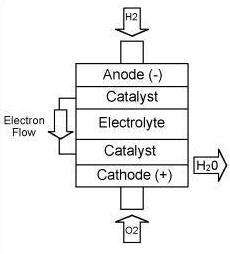If Successful, EADS Plans To Fly An Unmanned Hydrogen-Powered
Test Plane In 2014
 EADS Innovation Works, the
group’s corporate research arm, is working with university
researchers to find a new storage system for hydrogen which would
keep it as a solid. This technology would make it possible to use
hydrogen as a clean alternative to traditional hydrocarbon-based
fuels in airplane and car engines.
EADS Innovation Works, the
group’s corporate research arm, is working with university
researchers to find a new storage system for hydrogen which would
keep it as a solid. This technology would make it possible to use
hydrogen as a clean alternative to traditional hydrocarbon-based
fuels in airplane and car engines.
Hydrogen is a clean fuel which produces only water on combustion
or when combined with oxygen in a fuel cell to produce electrical
power. However, it can be expensive and difficult to store safely.
In addition, to store hydrogen as a gas demands high volumes, while
to store as a liquid increases weight and the energy requirement
(to compress it). Storage of hydrogen as a solid is, therefore,
very attractive. But minimizing weight and volume of the store is
challenging, and the rate of transfer from the tank to a fuel cell
or engine is often slow. EADS says these barriers are currently
holding back the use of hydrogen on an industrial scale in fuel
cells to provide power for airplanes and road vehicles.
Chemists at the University of Glasgow are working with EADS by
using nanotechnology to alter the design and material composition
of a storage tank with the aim of making it so efficient that it
will be feasible to use solid-state hydrogen on an industrial scale
for airplanes and cars. If the developments to the tank structure
are successful, EADS is planning to fly an unmanned
hydrogen-powered test plane in 2014 with a longer term view of
introducing commercial airplanes powered by hydrogen.
“Replacing traditional hydrocarbon-based fuels with
pollution-free hydrogen in airplane and car engines would deliver
huge benefits to the environment because carbon emissions would be
dramatically reduced” said Dr.-Ing. Agata Godula-Jopek, Fuel
Cells Expert in the EADS Power Generation Team, which is
coordinating the programme for the company.
Duncan Gregory, Professor of Inorganic Materials at the School
of Chemistry at the University of Glasgow, is leading the research.
He is using nanotechnology to alter the structure of the Hydrisafe
Tank, which is a new design under development by Hydrogen Horizons,
a Scottish-registered start-up company.

Basic Fuel Cell Schematic
The University and EADS IW have secured funding from the
Materials Knowledge Transfer Network - part of the UK Technology
Strategy Board - and the Engineering and Physical Sciences Research
Council (EPSRC). This will allow a student to carry out a four year
PhD project, spending time at the University and the
company’s German offices in Ottobrunn. The research will
involve testing the Hydrisafe tank with alternative hydrogen
storage materials.Modifying the construction of the tank will
extend its longevity, making it suitable to have a solid-state
hydrogen storage system that can feed a fuel cell at the required
energy densities required on an airplane.
Professor Gregory said: “Using new active nanomaterials in
combination with novel storage tank design principles presents a
hugely exciting opportunity to address the considerable challenges
of introducing hydrogen as a fuel for aviation. This collaboration
between engineers and chemists and between industry and academia
provides the pathway to achieve this.” EADS IW and Prof
Gregory’s team are seeking funding from the European Union to
build a European-wide team of academic and industrial partners to
examine the wider issues relating to using hydrogen on an
industrial scale to power airplane and car engines.
There is a recognition that while there is a strong potential
for the adoption of fuel cells into the portable fuel cells market,
key barriers to delivering this are the safe, efficient and
cost-effective storage of hydrogen. The research project, if
approved, would explore how best to deliver a practical solid state
hydrogen solution for portable and micro fuel cell systems.
 ANN's Daily Aero-Linx (04.15.24)
ANN's Daily Aero-Linx (04.15.24) Classic Aero-TV: 'No Other Options' -- The Israeli Air Force's Danny Shapira
Classic Aero-TV: 'No Other Options' -- The Israeli Air Force's Danny Shapira Aero-News: Quote of the Day (04.15.24)
Aero-News: Quote of the Day (04.15.24) Airborne 04.16.24: RV Update, Affordable Flying Expo, Diamond Lil
Airborne 04.16.24: RV Update, Affordable Flying Expo, Diamond Lil ANN's Daily Aero-Term (04.16.24): Chart Supplement US
ANN's Daily Aero-Term (04.16.24): Chart Supplement US




